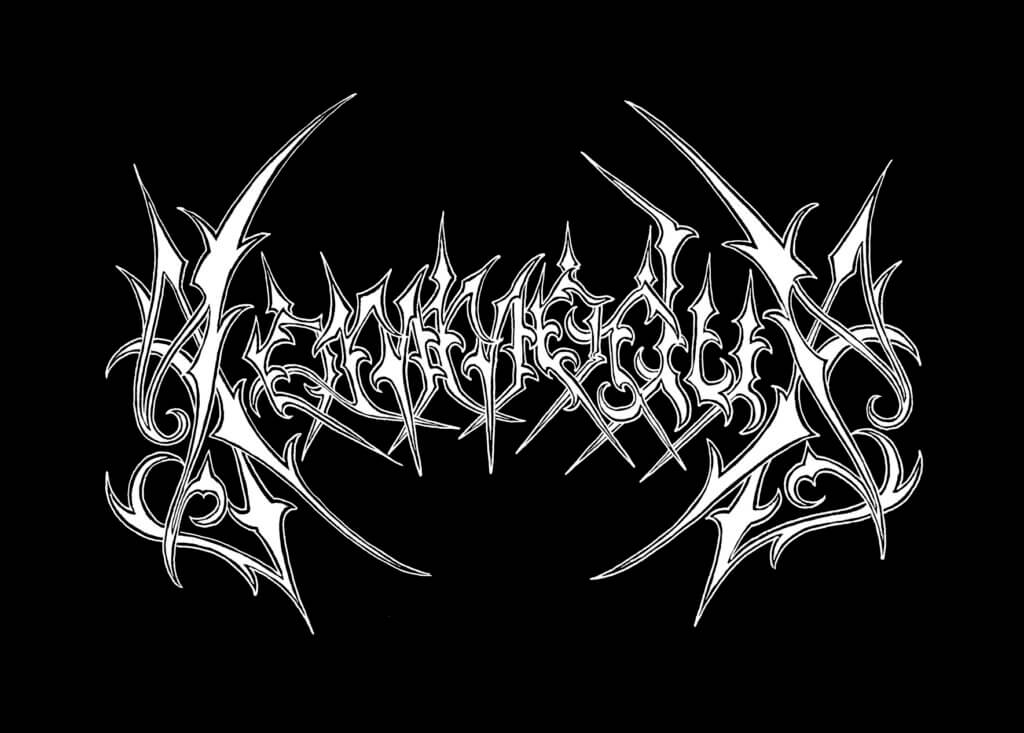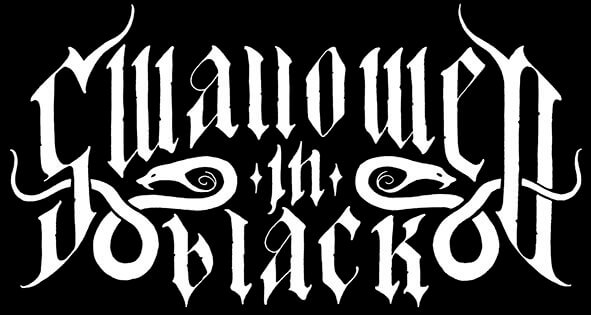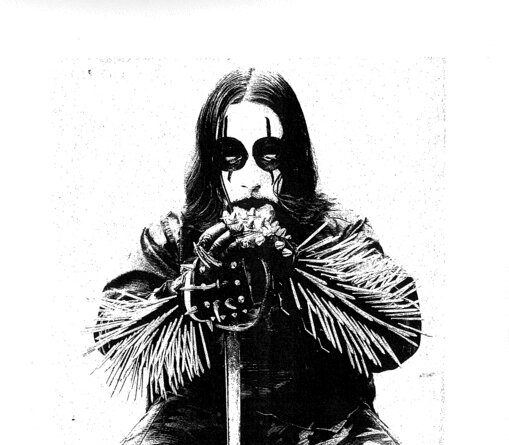“SOMETIMES WE HAVE TO BE DESTROYED TO COME BACK STRONGER AND BETTER” – LEPIDUS PLAGUE (KOMMODUS)
Consummately-crafted and expertly-executed third Kommodus full-length ‘A Foetal Wolf in Stained Glass’ showcases a dynamic, accomplished and utterly unorthodox underground Black Metal entity unlike any other. Boldly empowered by strength and resilience born of adversity, Lepidus Plague – the unflinching architect of this unnervingly original anthology – speaks of mental and spiritual transformation, the discipline of creativity and a recurring theme of overcoming.
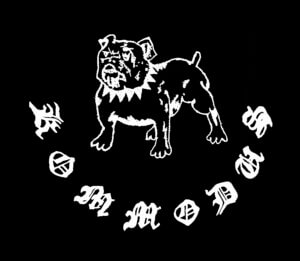 As appealing as the familiar nihilistic / misanthropic approach of Black Metal is, the defeatist, negative and perhaps weak outlook of such a worldview can be toxic and spiritually amputating. In contrast, the surprisingly triumphant, defiant and resilient-in-the-face-of-adversity undercurrent flowing through ‘A Foetal Wolf in Stained Glass’ is welcome and energising. Is this new record in any way autobiographical? Does the strength-through-suffering mindset stem from personal obstacles or struggles you’ve had to overcome?
As appealing as the familiar nihilistic / misanthropic approach of Black Metal is, the defeatist, negative and perhaps weak outlook of such a worldview can be toxic and spiritually amputating. In contrast, the surprisingly triumphant, defiant and resilient-in-the-face-of-adversity undercurrent flowing through ‘A Foetal Wolf in Stained Glass’ is welcome and energising. Is this new record in any way autobiographical? Does the strength-through-suffering mindset stem from personal obstacles or struggles you’ve had to overcome?
“That’s interesting that you have mentioned this. In recent years I have definitely gravitated toward a more aspirational philosophy within the music and subject matter – although to some degree it has always been a vein within Kommodus since inception. There’s undoubtedly an autobiographical element here, as I feel like I’m always attempting to do better, be better, learn more, conquer the weaknesses in self, etc. And yes, of course, it all stems from my own journey, which hasn’t always been easy, but has anyone’s?”
Suffering is precious and a backhanded blessing as it instils in the sufferer a strength and wisdom that they otherwise would not possess. Great things are born of suffering and it makes us more complete provided we don’t utterly succumb to it. Would you agree that maybe the trials and tribulations you’ve endured along the way have benefited as much as challenged you and that perhaps this darkness was necessary to bring Kommodus (initially) and ‘A Foetal Wolf in Stained Glass’ (subsequently) to life?
“One hundred percent; for better or for worse, Kommodus has been tied to, and is a product of, these experiences. There’s always a silver lining anyway, sometimes we have to be destroyed to come back stronger and better. I would have never fallen in love with weight training, or had the impetus for my contemporary artistic outputs, had I not lived the life I’ve lived.”
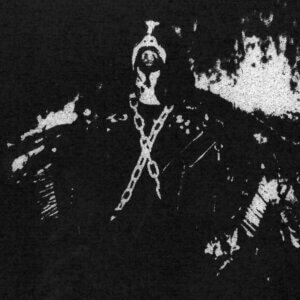 ‘Healthy body, healthy mind’ is one of the most valid clichés of all and certainly not a mantra promoted by our overlords. The benefits to both body and mind of physical exercise are immeasurable. When did you start weight lifting and to what extent has it transformed you?
‘Healthy body, healthy mind’ is one of the most valid clichés of all and certainly not a mantra promoted by our overlords. The benefits to both body and mind of physical exercise are immeasurable. When did you start weight lifting and to what extent has it transformed you?
“I started lifting weights about nine years ago and I would have to say the gym transformed me enormously mentally and spiritually. Having the routine and discipline helped pull me out of a terrible place and rebuild myself back up. That journey is ultimately tied to my love of this music – as during that time my workout playlists were all the quintessential black metal albums on repeat. The last two years have been more about maintaining strength and muscle rather than pushing the envelope, as I’ve been a lot busier than in the past, but I think it’s about time for a new program and an enthusiasm refresh.”
The new record is still a dark and sombre work, of course, but it’s difficult not to be inspired or called into action by a rendition as rousing as ‘The Mountain Of Past Lives’, which is musically and lyrically / vocally stimulating. Can you tell me about the message or mantra behind this particularly powerful and emotive composition?
“This song is loosely based off an ancient Buddhist narrative in which a teacher leads his student up a mountain, insisting that the younger does not look down or backward. When the youth inevitably does, despite the warning, he sees they have scaled a mountain of skulls which all resemble his own. The didactic here being that, to reach enlightenment, we first have to conquer all past versions of ourselves, all the dead weight, the carrion of prior experience. A fairly resonant concept to anyone on a journey of navigating and overcoming trauma and attempting to arrive at maturity and growth.”
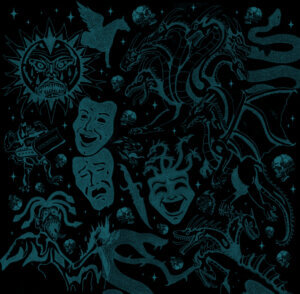 This is the second Kommodus full-length to go beyond the hour mark – a double album like the self-titled debut – so it’s another epic presentation of uniquely feral-yet-refined Black Metal art. A sense of evolution is clearly discernible. Does inspiration tend to come to you in a tsunami-like swell and what was the source of or spark for this latest bout of creativity / productivity?
This is the second Kommodus full-length to go beyond the hour mark – a double album like the self-titled debut – so it’s another epic presentation of uniquely feral-yet-refined Black Metal art. A sense of evolution is clearly discernible. Does inspiration tend to come to you in a tsunami-like swell and what was the source of or spark for this latest bout of creativity / productivity?
“I’m of the opinion, like many others, that inspiration is overrated. Discipline is what’s important. I find if I put the time in, inspiration flows naturally. It is not as if I’m inactive until some lightning bolt hits. I do think it can be useful to absorb as much as possible somehow, watch lots of films, read a lot, listen to a lot of music – this builds a subconscious stockpile that all eventually seeps through the unique filter of personal expression. For this record, there was no real source or spark other than just being eager to make some new music – I’d fallen into a good rhythm again of writing, so, strike while the iron’s hot.”
While Kommodus is destined to remain forever underground, repeat listens to ‘A Foetal Wolf in Stained Glass’ reveal a work that is as bold, meticulous, sophisticated and accomplished as it is empowering. Music as consummately crafted and expertly executed as this transcends the somewhat limiting ‘raw Black Metal’ tag and is worthy of a much wider audience. Do you embrace your cult underground status or in any way lament the consequence that – during this lifetime at least – due to being pigeonholed into such a narrow subgenre, only a limited few will ever fully appreciate your deceptively dynamic creations?
“I suppose anyone making this kind of music understands that there is a ceiling with it. If I only wanted to be popular and have a wide reach, I would create some other type of art. The fact that anyone at all appreciates Kommodus is rewarding enough.”
Do you perceive Kommodus as a one-man band, an army, or both at the same time? Even though you are the sole composer and primary performer, you have surrounded yourself with a trusty crew of ‘guest’ acolytes, many of them long-term (drummer Magnus performs on every recording) and the tribe appears to be growing both size-wise and in terms of influence (Magnus and Count Hoggeth both contribute additional acoustic guitars and get songwriting credits on the instrumental closer ‘With Horns Sharper than Fangs’, for example)…
“It’s still a one-man band. I love having my collaborators, of course, and Magnus for example plays an enormous role in making my vision come to life – but at the end of the day it’s just that: my vision. Sometimes I think of it like jazz music, how it’ll be a Miles album or Coltrane but there’s a line-up of different players in the liner notes for each record. It can also help give each release its own distinct sound by including various people, which is something I’ve come to appreciate. That instrumental song you mention was more or less an anomaly, as it arrived out of a jam with the three of us with acoustic guitars.”
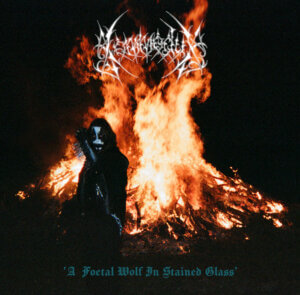 Influences from a range of genres and styles flow into your music, yet the prevailing spirit is undeniably Black Metal. Referencing the traditional BM days of yore, ‘A Foetal Wolf in Stained Glass’ is graced with arguably ‘the-most-Black-Metal’ Kommodus cover image yet. You reappear on the front cover for the first time since the three earliest demos, and it’s the first full-length to have an image of yourself on the front. While the paintings by Wrest and Burier respectively adorning ‘Kommodus’ and ‘Wreath Of Bleeding Snowfall’ were fantastic, your return to front and centre in classic Black Metal attire and pose fornenst a blazing bonfire feels like a statement of intent. What was the thought process behind this classic cover shot?
Influences from a range of genres and styles flow into your music, yet the prevailing spirit is undeniably Black Metal. Referencing the traditional BM days of yore, ‘A Foetal Wolf in Stained Glass’ is graced with arguably ‘the-most-Black-Metal’ Kommodus cover image yet. You reappear on the front cover for the first time since the three earliest demos, and it’s the first full-length to have an image of yourself on the front. While the paintings by Wrest and Burier respectively adorning ‘Kommodus’ and ‘Wreath Of Bleeding Snowfall’ were fantastic, your return to front and centre in classic Black Metal attire and pose fornenst a blazing bonfire feels like a statement of intent. What was the thought process behind this classic cover shot?
“I had the idea for that cover photo for a long time and had the opportunity to finally shoot it – seemed like a no-brainer to use it for the album cover. Maybe too I felt in some ways this record was a return to ‘classic’ Kommodus after indulging more conceptual ideas for the last string of releases.”
You’ve contributed visual artwork to each Kommodus record to date and this tradition continues on ‘A Foetal Wolf in Stained Glass’. How important a part of the process is this for you and did you ever consider using one of your own creations as the main artwork for a Kommodus release?
“I think it has indeed been important for me to contribute at least some visual artwork to my releases. Some have a lot and some have a little. I would love to do the cover art myself, I just haven’t gotten to a level with the craft yet where it would suit. But perhaps the next one.”
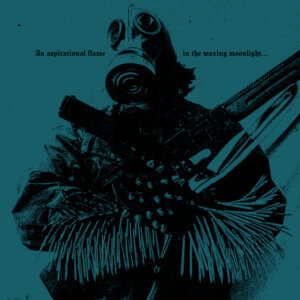 Navigating air, land and sea, past and future, this dimension and others, conceptually and lyrically the new record is a Twilight-Zone-like anthology of supernatural terrors and twisted fantasies. From ‘The Human Bulldozer’ becoming more machine than man to return from trauma to the otherworldly ascension of ‘The Spitfire Phantom’ (which borrows a sample from an episode of the aforementioned TV series), the maritime meeting of good and evil in ‘Dagger Hewn From A Walrus Tusk’ and the merciless celestial rapture of ‘Armoured Pegasus In Flight’, there’s a lot going on thematically. What is the common thread, narrative or message that ties all these tales / ideas together?
Navigating air, land and sea, past and future, this dimension and others, conceptually and lyrically the new record is a Twilight-Zone-like anthology of supernatural terrors and twisted fantasies. From ‘The Human Bulldozer’ becoming more machine than man to return from trauma to the otherworldly ascension of ‘The Spitfire Phantom’ (which borrows a sample from an episode of the aforementioned TV series), the maritime meeting of good and evil in ‘Dagger Hewn From A Walrus Tusk’ and the merciless celestial rapture of ‘Armoured Pegasus In Flight’, there’s a lot going on thematically. What is the common thread, narrative or message that ties all these tales / ideas together?
“Perhaps the idea of perseverance, survival and rising to destiny even if it’s fatal. ‘Overcoming’ seems to be the theme I return to again and again – not too sure what this says about me? Perhaps despite it all, I’m an optimist.”
While ‘Wielding A Sword Of Flame’ bristles with pride, strength, honour and defiance, there is no happy ending (for humanity, at least) as the sombre ‘The Sun Weeping Molten Tears’ presents an apocalyptic denouement / the sting in the tail. A sobering reminder that it’s not going to end well for any of us?
“Well, I guess this contradicts what I was just saying. This song is the conclusion of the album and the string of narratives therein, but Kommodus-world is cyclical and this apocalypse just ushers in a new beginning.”
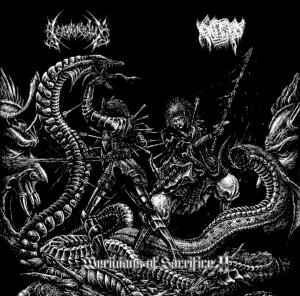 Dovetailing perfectly and perhaps poignantly with the new full-length is your latest substantial split release offering, ‘Meridians Of Sacrifice II’ – a second joint venture with Koreltsak following hot on the heels of the first. This one is arguably more of a collaboration than a mere ‘split’, with significant overlap across the two sides. As Kommodus and Koreltsak appear to have a shared ethos and strong bond, is this a release that’s particularly close to your heart?
Dovetailing perfectly and perhaps poignantly with the new full-length is your latest substantial split release offering, ‘Meridians Of Sacrifice II’ – a second joint venture with Koreltsak following hot on the heels of the first. This one is arguably more of a collaboration than a mere ‘split’, with significant overlap across the two sides. As Kommodus and Koreltsak appear to have a shared ethos and strong bond, is this a release that’s particularly close to your heart?
“Having ‘Meridians of Sacrifice’ now spanning two releases definitely ensures that it has a special place in the discography. I always enjoy working and collaborating with Koreltsak; we share a lot of the same interests and tastes within metal and outside the genre, and the process is always incredibly smooth and enjoyable.”
Is there a shared vision within the songs on ‘Meridians Of Sacrifice II’ or an agreed conceptual framework that you were both guided by when creating them? The Kommodus offerings are typically bold and the cyclical pattern you refer to above is clearly detectable as for example the darkness of ‘From The Alchemist’s Lair’ is banished by a rebirth of bloom and song on ‘Osgiliath Seasons’. Speaking of ‘From The Alchemist’s Lair’, it’s easy to relate to the idea of an ancient evil contaminating the world, seeking hosts to do its bidding. Would you agree that evil is as old as time itself and will always move amongst us?
“There wasn’t necessarily a discussion about shared themes but perhaps considering it was a sequel to the first split, the same ideas would carry over. I think there is an inherent darkness in all human beings and that we are in constant negotiation with it, sometimes what can seem innocuous is not really, but also vice versa.”
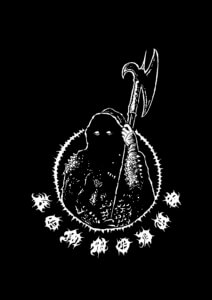 A broad range of musical influences and styles is infused into the Kommodus sound, suggesting very diverse listening habits. What are your most obscure musical passions? And what were the last two or three albums you bought?
A broad range of musical influences and styles is infused into the Kommodus sound, suggesting very diverse listening habits. What are your most obscure musical passions? And what were the last two or three albums you bought?
“I like everything really, or at least I’d argue there’s at least a few redeeming artists in each genre. Musically obscure is hard to say because we live in an era where anyone can find anything on Spotify within a couple of clicks. But, if I had to say, maybe like some world music or jazz deep cuts. The last few albums I bought physically would have been Serpents Isle and Secrets of Maya from Out of Season. And then some of the recent Goatowarex releases like Valac’s ‘Under the Ophidian Curse’.”
In the short term, what is next for Kommodus? Have you any fresh ideas or progress made on potential future recordings or collaborations? Is there a long-term plan or vision in your mind for Kommodus, or is it more a case of: live in the moment, follow your intuition and see where the creative journey takes you (let it guide you as opposed to the other way around…)?
“Up next for Kommodus I want to attempt an idea I’ve had for a while, which is to make a shorter release, demo quality, that is entirely acoustic / folky compositions – like the bookends I’ll often include on my releases. I’m still back-and-forthing with this idea but a few songs were recorded earlier in the year in Count Hoggeth Palmeri’s new home out in the wilderness – this environment seems to lend a certain something to the tracks, so the plan is to return and record a little more.
“I’m unsure about long-term plans, I like to take it one release at a time now, as there’s been times in the past where I’ve bitten off more than I can chew with obligation. But, to be honest, I’ve been enjoying the process a lot more lately, so at the very least I’d also like to make album no.4 next year.”